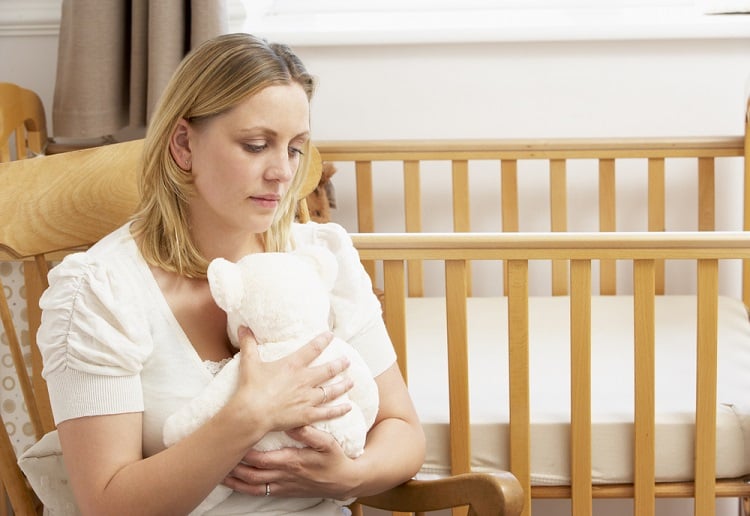Marianne Matthews shared her story on ROSPA in the hopes of preventing more families suffering similar tragedies.
“I write this blog in memory of my first child Eric, and with the hope that this message will help prevent more tragedies like ours,” the blog begins.
“Eric was four-weeks-old when he became unconscious while I was carrying him in a stretchy wrap baby sling – soft fabric that wraps around the chest and waist and holds baby, allowing a parent to keep their hands free as they go about their everyday tasks.”
On Christmas Eve 2013, Marianne took Eric for a walk in the sling. “He started to get a bit hungry and I tried to breastfeed him whilst carrying him,” she said.
“Everything happened so quickly and quietly I didn’t realise that something was very wrong. He had either choked or got into difficulties. By the time I got back, he had stopped breathing.”
“We called 999 and tried to resuscitate him. Sadly Eric never regained consciousness, and passed away in our arms a week later on New Year’s Day 2014.”
As a new mum, Marianne says she wasn’t aware of the dangers of using a sling.
“The dangers of slings were not mentioned in the antenatal classes we attended, or in any of the baby books we read,” she said.
She hopes that by sharing her story it will help prevent any more deaths.
“My advice is not to use a baby sling for a newborn baby – wait a few weeks until they are stronger and have more neck control,” she said.
“Don’t be tempted to multi-task by feeding a baby in a sling and check for safety standards and warnings before choosing a product.”
“The part that concerns me most is that some slings are marketed as “breastfeeding slings”. In my opinion, the feeding position is unsafe for baby (particularly a newborn) to be carried in, as they need to be kept upright to keep their airways clear. A baby trying to feed may make similar sounds to a baby struggling for breath, or make no sounds at all, and tragedy can occur in a minute or so. Added to this, the use of a sling while out and about may mean there are more distractions, and parents may not be fully aware of what’s happening.
I hope other parents find our story helpful, and it can in some way prevent another avoidable death like Eric’s from happening.”
The Royal Society for the Prevention of Accidents (RoSPA) provides guidance that states suffocation can occur in two ways.
“A sling’s fabric can press against a baby’s nose and mouth, blocking the baby’s airways and causing suffocation. Secondly, there are risks when softer slings are used if the baby is cradled in a curved position, nestling below the parent’s chest or near their stomach. Babies do not have strong neck control, which means that their heads are more likely to flop forward, which can restrict their ability to breathe.”
Sheila Merrill, public health adviser at the RoSPA, said: “We advocate using a carrier that keeps the newborn baby solidly against the parent’s body, in an upright position. Parents should ensure that they keep their baby’s chin off their chest, keeping the airways clear for breathing.”
How do I carry baby safely in a sling? via SIDS
SIDS shares, slings can be dangerous for your baby if worn incorrectly or if the wrong type of sling is used. A sling that straps around the adult’s neck, allowing the infant to lie in front of the adult, curved in a C-shape position may be dangerous.
If you choose to carry baby in a sling, at all times ensure that:
- baby’s airways are free at all times
- you can see baby’s face
- never using products that are described as ‘womb-like’ or a ‘cocoon’.
- lie your baby in a flat position with a straight back to ensure the baby’s chin does not rest on his or her chest
Babies can suffocate lying with a curved back with the chin resting on the chest or the face pressed against the fabric of the sling or the wearer’s body. At particular risk from these products are babies with a low birth weight, those that were born prematurely, or have breathing issues such as a cold.
Injuries can also occur from the baby falling from the sling when the caregiver trips and falls; the product malfunctions or its hardware breaks; or the baby slips and falls over the side.
TICKS Checklist
Remember and follow the TICKS rules:
T — Tight: Slings should be tight enough to hug your baby close to you.
I — In view at all times: You should always be able to see your baby’s face by simply glancing down.
C — Close enough to kiss: By tipping your head forward you should be able to kiss your baby on the head.
K — Keep chin off the chest: A baby should never be curled so that their chin is forced onto their chest as this can restrict their breathing.
S — Supported back: The baby’s back should be supported in a natural position so their tummy and chest are against you.
Share your comments below.
Shutterstock photo




















-

-
-
mom94125 said
- 09 Oct 2017
-

-
-
mom101628 said
- 18 May 2017
-

-
-
june11 said
- 03 May 2017
-

-
-
Ellen said
- 03 May 2017

-

-
-
mom206279 said
- 03 May 2017
-

-
-
taynik46 said
- 02 May 2017
-

-
-
BellaB said
- 02 May 2017
-

-
-
mom112217 said
- 02 May 2017
Post a comment5:22 pm
9:42 pm
8:59 pm
7:25 am
7:13 am
10:08 pm
4:25 pm
2:46 pm
To post a review/comment please join us or login so we can allocate your points.